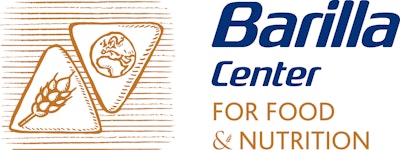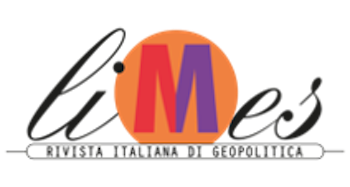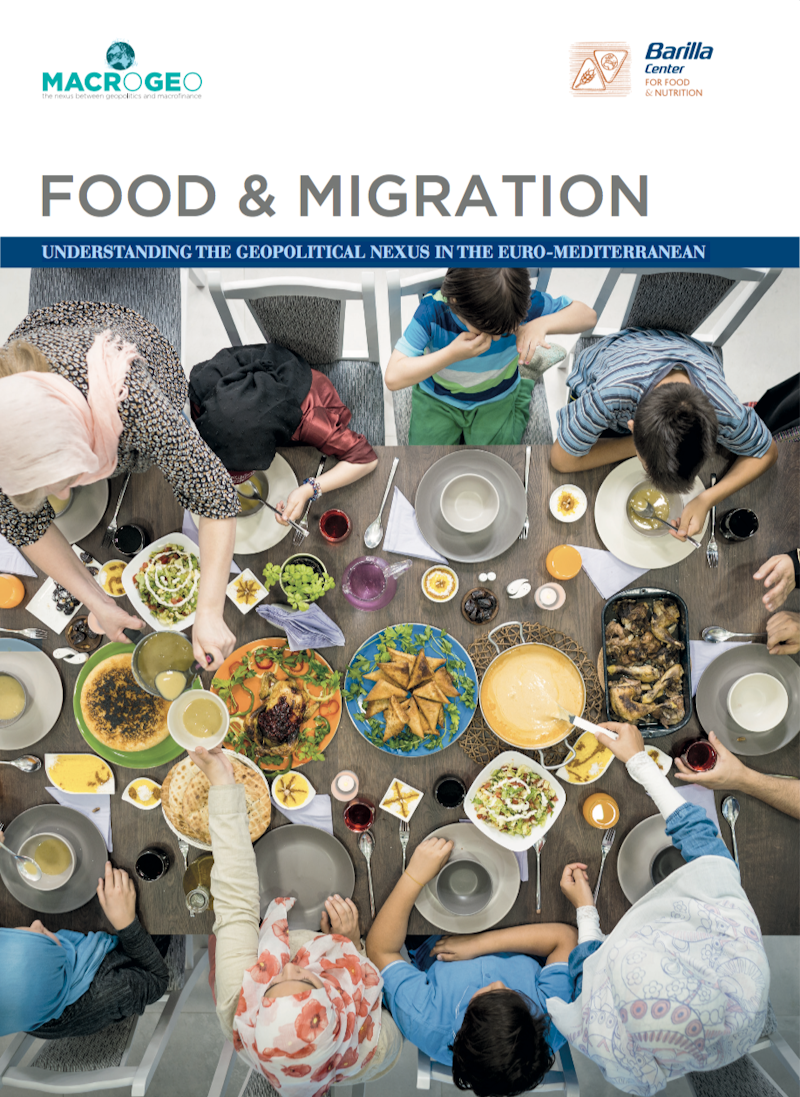Best practices on food and integration
by Gianna Bonis-Profumo and Michele Pedrotti
Improving living conditions and income in Senegal rural areas to prevent illegal migration by enhancing sustainable agriculture practices
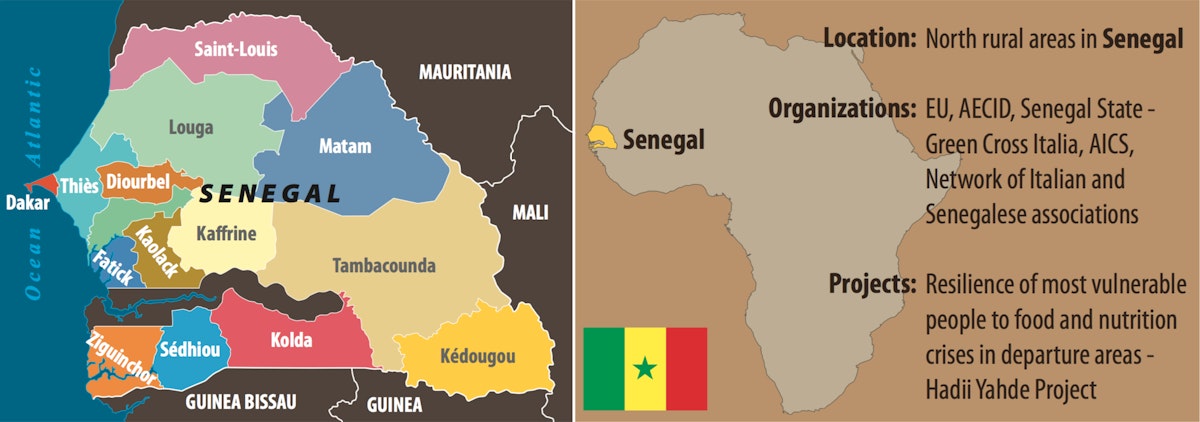
In Europe and elsewhere, there is a widespread image of Africa as a continent in crisis, whose population seeks en masse to find a route to Europe. The example of Senegal, however, illustrates that African migration is a far more complex phenomenon: movements to and from Senegal has been extensively in connection with other African states. Historically, Senegal was not a country of origin, but rather the destination of migrants. There is, however, evidence of a turnaround due to the economic crisis that the country has faced during the 70s and that intensified in the 90s, with Senegal becoming more and more a country of emigration and new target regions emerging for Senegalese migrants 1. International migration was initially a reaction to the economic crisis situation and has gradually become the standard model of social advancement.
Senegal occupies the 162 position (on 186) of the Human Development Index in the rapport of the UNDP of 2016 2. On a population of about 14 millions of inhabitants on which 63% with less than 25 years old, the country has a very high incidence of poverty. Especially in the rural area where about 70% of the total population live, the poverty is more accentuated (about 50% incidence) bringing with it high rate of unemployment and malnutrition. In the regions of Saint-Louis and Matam, in the north of the country, the departments of Podor, Ranérou, Matam and Kanel results to be the ones with the highest prevalence of both food insecurity and global acute malnutrition (GAM) with values much above the critic threshold of 15% 3. Moreover, according to the ENSAN report of 2013, in the rural areas also due to the high tax of male emigration, women are responsible for about 82% of the agricultural work.
For these reasons, the EU in collaboration with the Senegal state and the Spanish Agency for International Development Cooperation (AECID) a management body aimed at combating poverty and promoting sustainable human development, launched a project in August 2016 to improve the resilience and the living conditions of the most vulnerable populations of these districts.
The project, with a budget of 10 million € mainly provided by the EU Emergency Trust Fund for Africa (8 million €) but also from AECID and from the state of Senegal (1 million € each) has a time-frame of three years with different aims based on the multidimensional and interconnected determinants of malnutrition. First of all it wants to improve food security and nutrition by allowing the access to a diversified alimentation, to drinkable water, sanitation and to good food practices. Secondly, it aims to guarantee the access to basic services like nutritional health and functional education. Finally, the initiative wants to enhance the population resilience by improving local communities knowledge and abilities in governing and organizing. The project is developed through the collaboration with the Cellule de Lutte contre la Malnutrition (CLM) that is coordinating the activities with both the state for establishing some conventions and with a network of local NGOs and associations to realize the different actions at the local level. The outcome expected is to improve living conditions of the local communities and possibly, by in order to prevent illegal migration.
Another project started recently in the same area and going in the same direction is the Hadii Yahde Project – Energy to Stay in the local Phulaar language. Promoted by the Italian Agency for Development Cooperation (AICS) of the Ministry of Foreign Affairs, is targeting a total of 2.106 people (of which 1.887 women) in five villages along the Senegal River in the Matam region to help reducing the high rate of illegal migration in the country. Harsh living conditions, poverty, malnutrition, the lack of education and of opportunities have pushed many to seek a better existence abroad making the region one with the highest proportion of emigration in Senegal.
The initiative, implemented by the Green Cross Italia aims in nine months to strength the resilience of fragile communities through the introduction of sustainable agricultural systems (i.e. crops rotation). A total budget of 560.000 $ financed directly by Green Cross Italy, AICS and a network of both Italian and Senegalese associations, is invested to improve quality of life of small farmers by ensuring access to water resources and by enhancing the sustainable production capacity of territories by introducing water and energy saving innovations and small photovoltaic systems. These actions are thought also to reduce gender inequalities and increase the use of local labour to prevent inhabitants illegal emigration. In particular, the hope is that by boosting crops production women farmers will be able to hire men for field work that in this way they will not be forced to emigrate and face the dangers of the trip to Europe. It has been calculated that about 15.000 inhabitants of these villages will benefit indirectly from these actions that will also help to reduce climate change impact on the area.
References:
–
Human Development Report – United Nations Development Programme 2016 http://hdr.undp.org/en/2016-report
–
ENSAN 2013 https://www.humanitarianresponse.info/en/operations/senegal/document/enqu%C3%AAte-nationale-sur-la-s%C3%A9curit%C3%A9-alimentaire-et-la-nutrition-ensan-2013 - UN OCHA
–
Information on Senegal and immigration: focus migration website, last access November 2017 http://focus-migration.hwwi.de/Senegal.2636.0.html?&L=1
–
Information on the EU project from: the EU International Cooperation and Development page and from the action document of the project https://ec.europa.eu/europeaid/projects/resilience-most-vulnerable-people-food-and-nutrition-crises-departure-areas_en
–
News on Hadii Yahde project: June 2017 http://howafrica.com/italian-government-funds-agricultural-project-in-senegal-to-prevent-illegal-migration/ , May 2017 https://www.voanews.com/a/initiative-senegal-aims-reduce-migration-supporting-women-farmers/3867743.html , Green Cross website http://www.gcint.org/new-green-cross-sustainable-agriculture-project-roll-senegal/
Migration
flows management for temporary agricultural workers between Spain and Morocco
through a data-driven integrated initiative
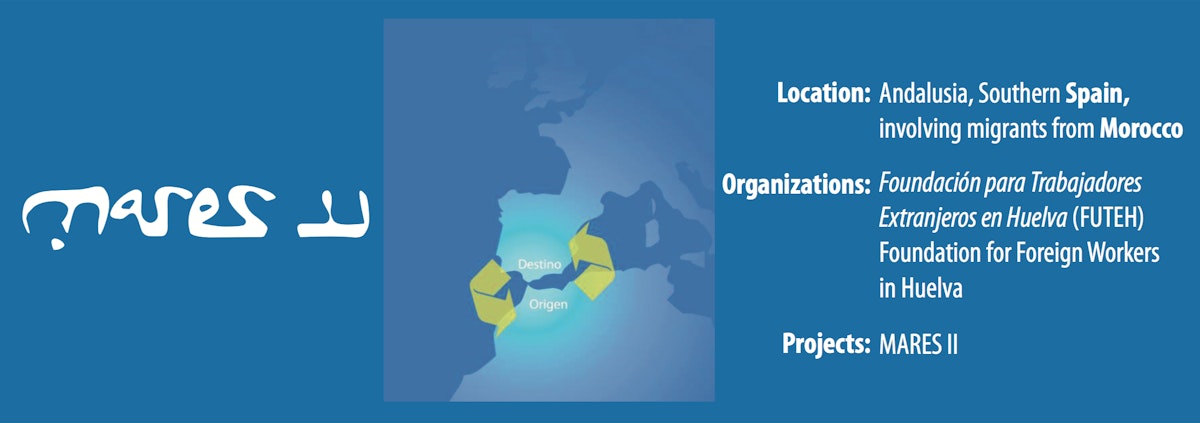
In Spain, migrants have increasingly been taking a larger role as seasonal agricultural workers. The agriculture sector has specific human resources needs that fluctuate according to the different cropping phases, which vary from crop to crop, and require a flexible workforce to meet its productive needs. Foreign workers, both legal and illegal, have been supplying such employment demands to Spanish agro-businesses, yet many issues have risen in recent years in regards to farm labourers’ employment and living conditions.
The Mares II project has implemented an innovative approach to promote the integration of immigrants and the management of diversity in agricultural enterprises in Southern Spain, with the aim to promote better coexistence and labor relations between foreign workers, businesses and the surrounding population. Its objectives integrate a “circular migration” model with improvements on the hiring Information Management System –including a biometric visa card for workers, while promoting a protocol of good practices and certification for the enterprises that are socially responsible with foreign labourers.
Its approach includes implementing a computerized system using bio-data to control workers hired in Morocco to perform agricultural labour in provinces of Andalusia, based on the digital verification of their fingerprints. The project fulfils multiple purposes, including flexible and streamlined hiring procedures at country of origin, and recording labourers’ digitalised profile on their legal situation and work experience for targeted selection by employee´s.
Santiago Lepe, the President of Foundation for Foreign Workers in Huelva (FUTEH) and leading implementation agency, states that the biometric cards “will avoid bureaucratic expenses and paperwork, as well as the frauds that usually occur with the current visa system”. In 2013, the innovative system registered 200 female workers who come for the strawberry season annually, and planned to identify 1,500 by the end of that year –out of the 5,300 temporary agricultural labourers hired through this model in Huelva province.
Another project objective focuses on the control of the working conditions of workers during their stay in Spain, for which a pilot programme has been developed with the collaboration of six agricultural companies from Huelva interested to be socially responsible, assessing for the compliance on worker’s occupational safety, health measures, and accommodation provided to them.
Mares II has been conceived as the continuation of the AENEAS-Cartaya project, where the “circular migration” model started in that province, and part of the EU financed projects aimed at managing migratory flows from third-party States. With a budget of 1.5 million euros and 2 years of duration, Mares II has been co-financed under the Border-Foreigner Border Cooperation Program (POCTEFEX), an initiative from the European Regional Development Funds (ERDF). Multiple stakeholders have been engaged in its implementation, including two foundations, various regional Government ministries, and the National Employment Agency from Morocco, showcasing the importance of collaborative approaches to manage complex transnational flows of migrants effectively.
This initiative was particularly timely, as in 2011 there were grave reporting of appalling working conditions experienced by migrant workers in Almería, another Andalusian province with intensive agricultural production. Almería is home to the so-called “sea of plastic”, with an estimated 40,000 hectares of greenhouses –the largest concentration in the world and visible from space, where 2.7 million tones of produce were grown in 2012, with a value of 1.2 billion euros each year, to satisfy Europe´s fresh produce needs year-round. Authorities in Almería have reported an interest to implement FUTEH´s model, particularly the best-practice protocol and certification for enterprises that ensure a socially responsible treatment of foreign workforce.
In Spain, 21% of employed agriculture workers in 2013 were from a foreign nationality (13% from third-countries and 8% from other EU nations). Moroccan nationals have the second highest proportion of employed foreign agriculture workers, with 26%, after Rumanians (29%). Andalusia is the region with the most foreign agricultural employees, representing 31% or over 55.550 people of the total migrant population in Spain. The seasonality of agricultural work in this region is 83%, the highest in Spain.
The European Parliament approved in 2014 the Directive 2010/0210 to establish legal guarantees for temporary workers coming from outside the European Union, where norms ensure dignified housing and same working rights as European citizens. The European Commission estimates that 100.000 third-country seasonal workers enter the EU every year to work in sectors such as tourism or agriculture.
References:
–
Almería data: Szajkowska, A. 2012. Regulating Food Law: Risk Analysis and the Precautionary Principle - As General Principles of EU Food Law. European Institute for Food Law
–
Spanish Migration data: National Statistics Institute, extracted from this report http://www.ccoo.cat/pdf_documents/Recerca AGREE complert versi%C3%B3_22_05_15.pdf
Collective agriculture to integrate and enable
asylum seekers
interact with society and organic agriculture
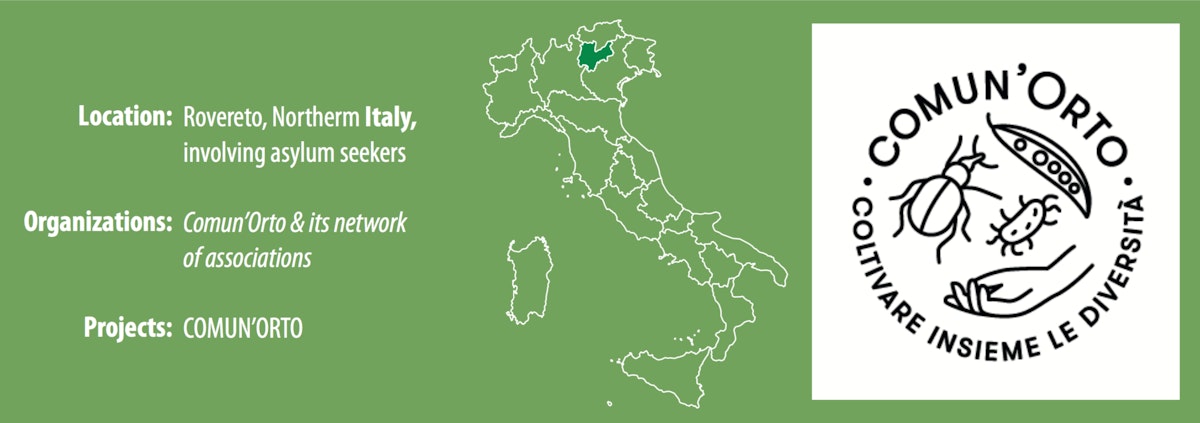
The short path to Gandhi garden already gave us a hint that we were headed to a special place. Flanked by elderflower trees, blackberries and red berries bushes it suddenly leads in front of a synergicist raised bed built during one of the last Comun’orto workshops. Tomatoes grown alongside with beans and salad in the middle of well-stacked mulch. Finally, by passing through a small fence it is possible to enter into what is the core of Gandhi garden, one of the two gardens of Comun’orto: small plants everywhere ready to be transplanted, several beehives, a wide collection of medical herbs, an insect hotel, two small toolhouses, and of course, different raised beds with every type of vegetables included –old local varieties like Teresa salad and Aldeno’s cucumber. Not to mention the spacious arena devised to gather and relax at the end of a hard gardening session and where many social events take place.
“I like to call it an agroecological and synergic garden” says Carlo, the coordinator of Comun’orto. Comun’orto is a project born in February 2016 from the initiative of 9 different associations 1 together with the municipal administration of Rovereto and financed through the grant Intrecci Possibili 2. In two different spaces of the Brione neighborhood in Rovereto (Gandhi and Driopozzo gardens) with a total of about 500 m2 of gardens, it was decided to start an “approach to urban and organic agriculture in order to learn how to grow vegetables in a sustainable and collective way” explains Carlo.
One of the main reasons why this project was born is to offer an alternative type of arrival to asylum seekers, who in Rovereto amount to about 350. Comun’orto – managed by Carlo together with a core team of about 15 volunteers and an extra group of about other 30 volunteers of all different ages – hosts and offers internships as a form of first welcoming to asylum seekers. In particular, five asylum seekers at a time are engaged twice a week in a two-month internship which aims to provide them with an introduction on how Italian working realities are, so as to introduce them to key aspects of European working standards. The project is one of the first responsibilities which asylum seekers receive when they arrive to Italy and it is a great opportunity to socialize and learn Italian with other volunteers, school students visiting the garden, as well as participate to many social events. The actual group, composed by five 22-year old young men from different northern Africa countries, has the chance to learn about practical principles of Italian plant biodiversity and organic agriculture while at the same time sharing their stories and their experiences with local citizens. Together with other volunteers, they also enjoy the results of their hard work by eating the tasty products they contributed to produce. As a collective garden, fruits and vegetables are shared based on the amount of working hours of each participant, while a part of it is used in social dinners organized at the gardens. At the end of the internship and at the end of the path to integration, each asylum seeker receives a certificate.
“Comun’orto is not just a garden. It is also matter of attitudes” says Silvia, one of the Hotel Quercia operators, a company involved in the project and in charge of hosting asylum seekers mainly hailing from West Africa and Pakistan. “It is not for everyone and that’s why we try to select people who had some sort of agriculture experience in their home countries. In this way Comun’orto can become a path to link them back to their roots”.
And it is true: Comun’orto is much more that a common garden where everyone can help growing seasonal vegetables in a healthy and sustainable way which are then shared by the group. It is an aggregative place for the community where many different activities are organized for everyone: from concerts, to cooperation with school students from the adjacent Gandhi secondary school, to different workshops on how to transform food, to how to build an insect hotel. It is a unique place which allows to dream for a more sustainable and greener urban development, built together independently from age and origin.
Notes
1 Quartiere Solidale, Italia-Nicaragua, Punto d’Approdo, Brave New Alps, Associazione Shishu, Comitato Associazioni per la Pace e i Diritti Umani, GaSud, Gas La Sporta, Associazione Murialdo
2 Promoted by La Fondazione Trentina per il Volontariato Sociale and the Non Profit Network-CSV Trentino
References:
–
Italian asylum seekers data: Ministro dell’Interno report http://www.libertaciviliimmigrazione.dlci.interno.gov.it/sites/default/files/allegati/riepilogo_dati_2015_2016_0.pdf
e-Food cards offer choice, convenience and nutrition security for Syrian families
at Turkish refugee camps
and surroundings
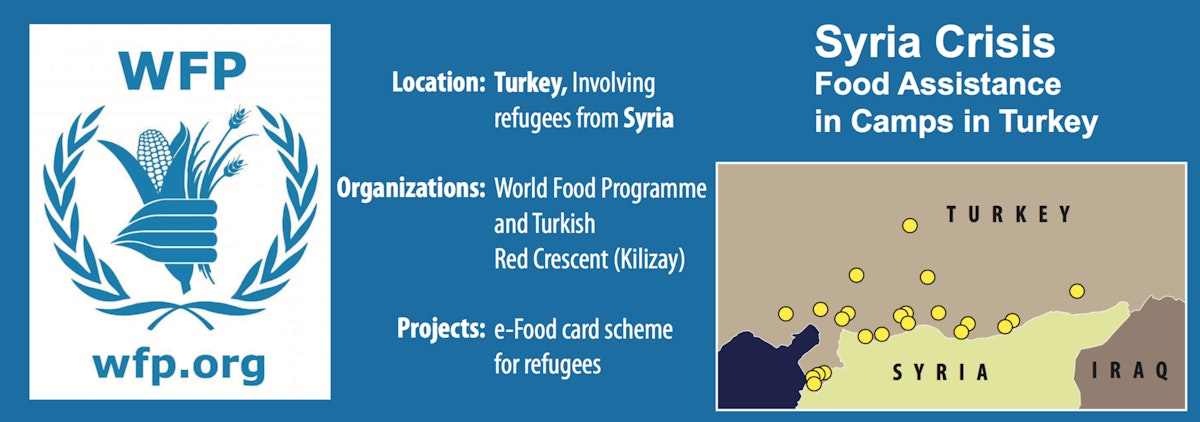
In Turkey, over 150,000 Syrian refugees residents in 11 camps and around 90,000 living off-camps access an e-Food card to purchase nutritious food of their choice in designated shops and supermarkets. The programme was rolled out in 2012 in government-run camps, and as of June 2016, a quarter of a million Syrian refugees receive food assistance inside and outside camps. Envisioned as an innovative and efficient way of supporting refugee families, the e-Food card is designed to purchase diverse and nutritious food items of their choosing.
This electronic card is similar to a debit card, with the total amount of assistance for the household loaded electronically onto the e-Food card twice a month. Such system was developed by the UN World Food Programme (WFP) and implemented by the Turkish Red Cresent (Kilizay), enabling refugee families to shop and select their ingredients instead of receiving the traditional food aid packages of standard composition. The e-Food card works in stores selected by WFP, Kizilay and the Government, which ensures sufficient quantities of nutritious and fresh foods are available for purchase at competitive market prices. Retailers are located in the camp and in nearby urban areas, which have a contract with Kizilay to ensure compliance with the programme regulations and quality standards.
Not only convenient for families to eat meals that resemble the ones they cooked in Syria, the e-Food card scheme also ensures the nutritional value of the refugees’ diet. Fresh produce can be bought, normally not included in traditional food rations, while unhealthy products like sweets, alcohol and cigarettes cannot be purchased with the electronic card. In 2016, each family member received in their e-Food card 50 Turkish Lira per month, around 18 euros. This amount is in line with the WFP referential cost of a food-basket providing 2100 calories daily, estimated at 62 Turkish Lira. WFP’s monitoring and evaluation mechanism shows that the dietary diversity levels of beneficiaries are high –a strong indicator of nutritional status, reflecting how the programme is enabling the consumption of a nutritious diet through the purchase of basic items in the established food basket.
In Malatya camp, one of the 26 Government-run camps in Turkey, nearly 8,000 people live in small container shelters. Amina Akkud, a mother of five who lives in the camp, holds the responsibility to ensure all four of their children go to school and eat healthy food since her husband is living abroad. She worries about her 20-year-old daughter, Shahad, who stayed back in Syria with her husband and baby. “Because of the conditions in Syria, my daughter is only able to eat meat once a month if she is lucky. Here we eat meat twice a week, thanks to the World Food Programme e-card.” Women serve an important role in the camp, with many heading their households as the ongoing conflict in Syria has separated countless families and claimed even more lives.
The e-Food system provides the opportunity to purchase families’ favourite foods and cook healthy meals in their shelter or home, improving the convenience over hot meals delivery. Importantly, the e-Food cards seem to increase women’s control within households in meeting food needs and meal coordination, as they can be fully involved in the selection of food for their families. Consuming meals that are familiar is of high value in such prolonged distressful situations, where eating foods to which refugees are culturally connected to can provide some sense of relatedness and relief stress. Ultimately, a stable source of food generates a level of normality that is of immense emotional support to refugee families.
Kahramanmaraş is another of Turkey’s refugee camps, mostly with Syrians residents. Four years ago refugees like Salwa started receiving e-Food cards. “With the card we are better of. Before we used to receive hot meals but many times my children couldn’t eat them. The card is easier, I can buy what I like and cook what my family likes our way. I come 5 times a week and I spend between 100-125 liras”, around 30-40 euros, says Salwa. This programme brings a degree of independence to Salwa’s life and the dignity of choosing her own food.
A 40 million euro contribution by the European Union’s (EU) Humanitarian Aid Operations in March 2016 has allowed the programme’s expansion to reach most vulnerable families living outside camps, where 2.3 million Syrian reside, and raising the amount of people eventually targeted to 735,000. The vast majority of Syrian refugees, 90% according to the European Commission, live outside camps in urban and rural areas and are often unaccounted for. Their identification is an enormous job and field monitors report that almost one third of Syrian households living off-camp are food insecure.
The programme success is well demonstrated by the high satisfaction of beneficiaries –who prefer choosing and cooking their own food rather than eating from provided hot meals, as well as by its benefits to the local economy. Local communities are impacted directly as beneficiaries spend their food entitlement at shops and supermarkets that are owned and managed by local retailers, supporting better integration between the Turkish society and Syrian refugees. For off-camp beneficiaries, the programme partners have assessed and contracted commercial food markets to participate in the e-Food card scheme, while also aiming to foster greater market competition and ensure the quality of foodstuff at lower prices. Moreover, the scheme allows for over 70% savings when compared to the hot meals provision, while eliminating food waste generated during their distribution.
The war in Syria has forced millions to flee their homes. Since April 2011, many have crossed to Turkish due to sharing a 900km border with the war-inflicted country. Six years after the humanitarian crisis started, almost five million people are registered as refugees in neighbouring countries while six and a half million are internally displaced within Syria. Turkey now shelters the largest refugee population in the world with over 3.1 million, 2.7 of which are Syrian.
References:
–
http://reliefweb.int/report/turkey/more-onion-and-bread-e-food-cards-syrian-refugees-turkey
–
https://data2.unhcr.org/en/documents/details/51036
–
http://www.euronews.com/2016/04/28/turkey-e-food-cards-for-refugees
–
http://www.ennonline.net/fex/48/efoodcard
–
https://www.wfp.org/stories/turkey-story
–
https://www.betterthancash.org/news/blogs-stories/wfps-new-e-card-reduces-syrian-refugees-suffering
Mumm the Egyptian startup that delivers meals cooked by refugees
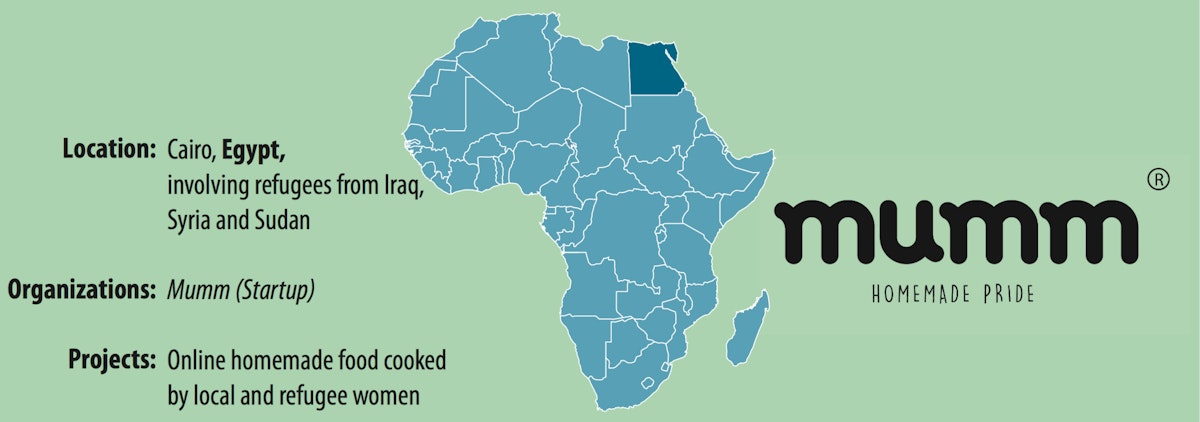
Mumm is an online Egyptian platform which connects home-based cooks called “Food Partners” with nearby customers looking for healthy, affordable and nutritious meals delivered to their doorstep. The startup also recruits Syrian, Iraqi and Sudanese refugees and trains them to become Food Partners through a partnership with the Fard Foundation, a Cairo-based NGO. By matching home cooks to the market, Mumm provides a means for local women and refugees to make a living with their cooking skills and delicious traditional recipes.
This innovative web-based business is providing Egyptian women with a way to achieve financial independence in a county where 25.5% of them are unemployed, while also supporting refugee families to earn much needed income. Registered asylum seekers and refugees in Egypt come mostly from Syria, totalling 71%, while there are also over 26,000 Sudanese and almost 7,000 Iraqis. Through the cooperation with the Fard Foundation, many refugees are finding a way to support their families, such as for Iman Omanein, who now cooks the typical food she used to make before fleeing to Egypt to escape the war. “As a Syrian woman married for 23 years, of course I know how to cook”. Iman undertook a free cooking course with Mumm which also focuses on food quality and safety, and then became a Food Partner.
An essential component of Mumm is the fact that Food Partners, mostly women, cook in their own kitchens while the company takes care of marketing and delivery. Web users order by first entering their location and then choosing from the meals currently being offered in their nearby areas by selecting among attractive photos of home cooked meals. Choice includes single portions, family meals and even frozen rations, a service currently available in many neighbourhoods of Cairo city and its surroundings. Meals are delivered to customers’ location, which save around 20% for similar dishes found in restaurants. Cooks earn an average of 6,000 Egyptian pounds or 300 euros a month, according to the company’s estimates, which Iman uses to sustain her household.
The benefits of this entrepreneurial concept are multiple as Waleed Abd El Rahman, co-founder and CEO of Mumm, explained in an interview in 2016. “There are a number of areas where Mumm positively affects society: We provide home cooks the opportunity to work, we work with refugees in order to provide them with job opportunities and we provide healthy, nutritious food to help combat the issue of obesity.” It also helps women achieve some economic independence by linking them to the local economy, as Mumm provides “women the opportunity to create a sustainable livelihood for themselves, from the convenience of their homes, while insuring they are equipped with the right tools to deliver quality, safe and tasty food”. Providing means to economic independence and employment security is a valuable outcome in a society which generally confine women their private sphere.
The Homemade food tech startup was recognised earlier this year by the World Economic Forum (WEF) and the International Finance Corporation as one of the 100 top startups in North Africa and the Middle East which uses digital technologies to promote social change. Last August, Mumm also secured a US $200,000 investment from 500 Startups, a US-based accelerator and fund, which the Egyptian online company will use to increase its user base and grow its team. Sharif El-Badawi, partner at 500 Startups, said “Not only do we believe that Mumm will help corporate employees eat healthier and be more productive, we are keen on empowering women and providing a means to independence and job security for them”.
Homemade meals also tend to be prepared with much more care and love than those from food retailers, bringing an added value to the service. Dishes are cooked on demand while using fresh ingredients, which is helping to promote an appetite for healthy food among consumers in Cairo. The Egyptian cooking start-up is helping refugee women not only by providing them meaningful employment, but also by exposing customers to the more varied Syrian cuisine.
It seems that Mumm entered the market space at the right time and place, beginning to deliver meals from 6 October in 2016. In 2013 an article by The Guardian explains how this satellite town close to the country’s capital saw a huge increase in the number of Syrian restaurants and delis since the conflict forced many to escape. Numerous refugees well integrated in this town and opened restaurants and groceries stores, as with the Syrians came their food. “When we first opened, Egyptians would come in out of charity,” Abdoul Kheir recalls, a Syrian deli owner. “But then they noticed the difference in quality and they starting coming back because they were addicted to it. Now I’ve got more Egyptian customers than Syrian.” Within a short period, Egyptians got a taste for the refugees’ food –a source of pride among the Syrian community, that now Mumm is cleverly capitalizing on.
References:
–
Mumm web: http://www.getmumm.com/
–
https://en.reset.org/blog/mumm-egypts-recipe-financial-independence-06262017
–
http://disrupt-africa.com/2017/08/500-startups-invests-200k-in-egyptian-food-delivery-startup-mumm/
–
https://dailynewsegypt.com/2016/07/16/mumm-and-a15-join-forces-to-provide-home-made-food-online/
–
https://www.theguardian.com/world/2013/jul/25/syria-refugee-restaurant-food-egypt-city
–
UNHCR: http://data.unhcr.org/syrianrefugees/regional.php
–
3RP, 2016. EGYPT Regional Refugee & Resilience Plan 2016-2017, in response to the Syria crisis.
REFOODGEES
Overturning the victim role of asylum seekers
by empowering them through food
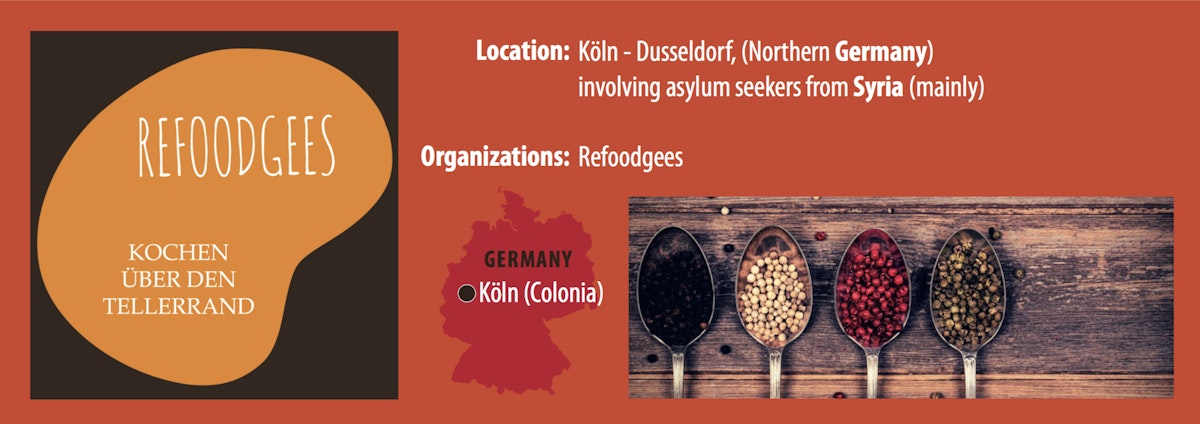
According to a survey by the Organization for Economic Cooperation and Development, Germany is the second most popular migration destination in the world after the United States. It is estimated that about 11 million of the people currently living in Germany were actually born elsewhere, meaning that over one in eight members of the German population is an immigrant. Since the 1960s, Germany has been one of Europe’s major migrant destinations but, with the beginning of the recent refugee crisis in 2015, more than a million of asylum seekers from outside EU have arrived in the country. During such a crisis, it has been calculated that German states spent around €23 billions on refugees in 2016 to be able to welcome them all. Because Germany is federally organised and migrants are distributed very heterogeneously, a vast variety of different initiatives can be found at a regional (Land) and local level to promote their integration.
In Koln (North Rhine-Westphalia) the refugee population more than doubled in just two years passing from 5.141 asylum seekers in December 2014 to 13.253 in December 2016 mainly coming from Syria and Iran. The city has one really good example of the pro-active German attitude in welcoming and making migrants an active part of what is the most powerful EU economy: the project REFOODGEES. Started in 2015 by Christian and his girlfriend, REFOODGEES tries to empower immigrants through something which is essential to all humans: food. It all started as a cooking group gathering every two weeks to cook and share with migrants. More than 40 people, half of whom from Germany and the other half made up of asylum seekers, mostly Syrians but also Nigerians and Kurds, are still participating to these dinners while in the meantime the project has gradually grown as much as to morphing into a start-up.
The group actively involved in the start-up is smaller and made up of about 15 people; of those, half are Germans and the other half are asylum seekers. They mainly carry out two activities: organize or participate to cooking events around Germany and offer an excellent catering service. The catering service they provide has not to be thought as a normal restaurant service: its aim is to connect people and therefore the events are very interactive. During these evening in Koln and Dusseldorf the chefs have the opportunity to meet with clients, to introduce themselves and to tell their stories.
In 2015, the start-up received a considerable private donation which was used to buy a van which was immediately transformed into a professional food truck. With the truck, the group traveled to many different food festivals around Germany, spreading their exotic food and their new idea of integration. Street food festivals represent a unique opportunity for the people who otherwise would not be in touch with refugees. In general, the public warmly received the project: yummy food seems the best way to overcome their initial distrust toward immigrants and to make people more willing to listen to asylum seekers’ stories.
“What it is important of our project” says Christian “is what happens to our chefs. Migrants, especially asylum seekers usually feel as victims in their new countries and feel like they have to be grateful to everybody. With food their role gets reversed since they are able to produce something for what people thank them. This is what I think changes the minds of both Germans and people who arrive in the country”. Moreover, while cooking and meeting the German society, asylum seekers have a great chance to learn the language. Christian remembers that at the beginning most of them did not know any word of German and they used to mainly communicate in English or by using their hands. Now, thanks to their experience and to the language courses they enrolled in, you can sometime hear them correcting Germans while at the same time teaching some words in Arabic.
All of the participants at the project are volunteers since all the profits made during the events are used to fund their own project or to support other initiatives aimed at helping migrants. For example, they work with the Refugees Foundation and their project support refugees on the run, which guarantees other refugee camps outside of Germany any kind of support, from supplies to tents, to toys for the many children living in the camps.
For their own project they are investing in providing the group with everything necessary and Christian is now looking for a chance to participate weekly at the Koln food market in order to be able to pursue its project through food. Moreover, the start-up is now providing two of the chefs with a driving license, with the aim to make the group more independent. And that’s exactly the future goal of this initiative: making asylum seekers more autonomous by trusting them and giving them back their dignity.
Notes
1. Information on migration to Germany: Koln website, Bloomberg report 2014, news March 2017
2. Information on REFOODGEES project: REFOODGEES website, REFOODGEES facebook page, interview with Christian, founder and director of the project
Refences
–
http://www.stadt-koeln.de/leben-in-koeln/soziales/koeln-hilft-fluechtlingen/fluechtlinge-koeln
